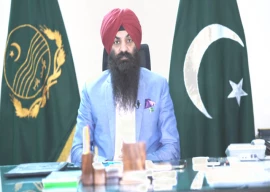In the National Assembly, Prime Minister Yousaf Raza Gilani has set a tradition of answering the questions himself.
The procedure for question hour is simple. Members from both sides of the divide submit their questions to the question branch of the assembly and the queries are then sent to the relevant ministry or department. Every day assembly proceedings start with question hour on a particular department or ministry.
The stipulated hour gives not just the opposition but also treasury backbenchers a shot at their minister. But in our peculiar Pakistani brand of democracy, which remains underdeveloped after 64 years, nothing is a tradition and nothing is sacrosanct. Institutions and traditions only matter when there is a political will to uphold and respect them.
Yesterday’s question hour in the Punjab Assembly was a mockery of democracy and governance. Some of the questions to be answered were more than three years old.
According to the staff of the question branch, departments take an average of between two years and two-and-a-half years to respond to a question sent from the assembly. Innocuous inquiries, like about the number of staff employed at a government facility, can take years to answer. According to Rule 50 of the Rules of Procedures of the Punjab Assembly, the assembly secretariat can hold a question for no more than two weeks, after which it must be forwarded to the department concerned.
The department then has up to eight working days to reply.
Apart from being years late, answers are often incomplete, inaccurate or simply irrelevant. MPA Samina Khawar Hayat asked for details of the chief minister’s discretionary funds back in 2008.
Three-and-a-half years later, she got this response: no details are available. Maybe it’s understandable if the chief minister doesn’t want to share his spending habits with the house; but why hide the exact number of teachers working in a particular school in an area?
Yesterday, Education Minister Mujtaba Shujaur Rehman, a virtual stranger in the house because of his long and frequent absences, was at a loss to explain why his department could not send back reasonable replies to questions even after sitting on then for two years.
Once question hour was over, the only minister in the house rushed out of the door, leaving none behind to take up call attention notices. Call-attention notices used to be answered by the chief minister himself, but Chaudhry Pervaiz Elahi decided during his reign from 2002 to 2007 to change the rules and allow a minister to answer them instead. On Tuesday, the speaker asked a parliamentary secretary to fill in for the ministers and answer the notices.
The opposition was infuriated and a debate on the subject kicked off. The speaker eventually backed down and the opposition’s point was carried.
Soon after, an opposition member pointed out the lack of quorum. The treasury, with no legislation on the business agenda, looked relieved.
Published in The Express Tribune, January 20th, 2012.

















COMMENTS
Comments are moderated and generally will be posted if they are on-topic and not abusive.
For more information, please see our Comments FAQ